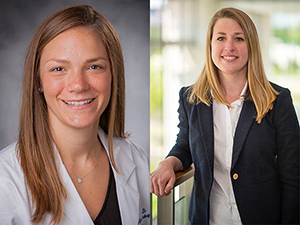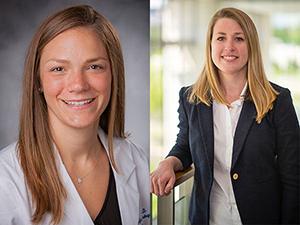

Q: What is leadership in anesthesiology?
A: Hauck: For the leadership development program for the residents, we use the Duke Healthcare Leadership Model as our guide. Each of the five core competencies (integrity, emotional intelligence, teamwork, selfless service, and critical thinking) and the core principle of patient-centeredness are integral to leadership in anesthesiology.
A: Grantham: There are many different definitions of leadership. For our program, we felt that implementing a values-based approach to leadership was really important. The Duke Healthcare Leadership Model and our view of leadership in anesthesiology follow the servant-leadership model, where leadership is viewed as a type of service to others.
Q: Why is learning about leadership important for residents in anesthesiology?
A: Hauck: Residents are presented with leadership opportunities and challenges every day. Whether aligning a team in the OR to help a patient, or leading a patient’s care team through a complex pain management plan, or leading a call team of residents and CRNAs, residents are continually called to lead. These leadership skills become even more critical as residents become fellows and attending anesthesiologists.
Q: Who has had an impact on you as a leader?
A: Grantham: I’ve worked with so many great leaders over my career. I respect Dr. Donna Petherbridge’s ability to connect with people and lead a diverse team at NC State. From my doctoral advisor, Dr. Audrey Jaeger, I’ve learned how to challenge people to grow while remaining supportive as a leader. Here at Duke, I’m impressed with how many individuals exhibit leadership skills on a daily basis. The individuals helping with the leadership development program, including Drs. Joseph Doty, Nancy Knudsen, Anthony Galanos, Mark Stafford-Smith, and Brandi Bottiger, have had such a positive impact on me as we’ve worked to plan this curriculum.
A: Hauck: I have learned from so many great leaders in my education and training. The first leader to inspire me was Dr. Erin Reid, a hematologist and professor of medicine at UCSD. As her clinical trials coordinator, I admired her ability to influence others and bring teams of people together through her genuine investment in building relationships and by treating each colleague and patient with respect as an equal individual with a valued opinion. At Duke, Dr. Stafford-Smith has modeled and taught me how to use emotional intelligence to understand my team and to adapt my leadership approach accordingly. I have learned about resiliency and integrity in leadership from Dr. Dean Taylor, professor of orthopedics and founder of the Feagin Leadership Program. I admire and appreciate the strengths and unique styles of the many leaders who have mentored me throughout my career.
Q: If you could describe leadership in three words, what would they be?
A: Hauck: To influence others.
A: Grantham: To paraphrase a Ralph Waldo Emerson quote, I would say a leader is “someone who inspires.” Leadership then becomes about selflessness, empowerment and transformation.
Q: How can residents build their leadership skills at Duke?
A: Hauck: Through the Leadership Development Curriculum, our residents will have the opportunity to reflect on their own leadership strengths and those of their team members. During their three years, residents will participate in nine workshops where they will learn and practice leadership skills, and then have the opportunity to apply these skills to their clinical practice. While a curriculum will add structure to learning leadership, I strongly encourage residents to continue to learn to be the kind of leader they envision through relationships with mentors.

